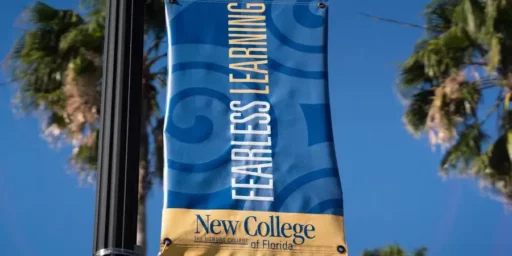University Professor: World’s Least Stressful Job
I've been out of the classroom for just over a decade now and, apparently, things have changed radically.
As a young undergrad, I saw my senior professors living a pretty good life: They pretty much had their lectures in the bag and could spend most of their day gossiping with one another, reading the paper, and BSing with the students.
Fast forward a few years, to when I was teaching college, and it was still a pretty good life but a little more complicated than it seemed. My time was much less structured by a chain of command than it was when I was an Army officer but there was always more to do than there was time to do it. Which meant working late into the evening doing things like planning lectures, grading papers, and building my course website. Those long winter and summer breaks, which had become work time for me as a grad student, was still work time. Since there was no way to conduct research or write papers around a 4-4 teaching load, that’s when you worked.
I’ve been out of the classroom for just over a decade now and, apparently, things have changed radically. Indeed, Forbes reports that university professor is the least stressful possible job.
University professors have a lot less stress than most of us. Unless they teach summer school, they are off between May and September and they enjoy long breaks during the school year, including a month over Christmas and New Year’s and another chunk of time in the spring. Even when school is in session they don’t spend too many hours in the classroom. For tenure-track professors, there is some pressure to publish books and articles, but deadlines are few. Working conditions tend to be cozy and civilized and there are minimal travel demands, except perhaps a non-mandatory conference or two. As for compensation, according to the Bureau of Labor Statistics, the median salary for professors is $62,000, not a huge amount of money but enough to live on, especially in a university town.
Another boon for professors: Universities are expected to add 305,700 adjunct and tenure-track professors by 2020, according to the BLS. All of those attributes land university professor in the number one slot on Careercast.com‘s list of the least stressful jobs of 2013.
[…]
To gauge which jobs are the least stressful, CareerCast considered the 200 professions in its database and focused on 11 different job demandsthat it deemed likely to provoke stress, including travel, growth potential, competitiveness, physical demands, hazards, environmental conditions and risk to one’s own life or to others’.
According to Tony Lee, CareerCast’s publisher, the least stressful jobs have one thing in common: autonomy. “These jobs tend not to have someone standing over their shoulder putting pressure on them to get things done,” he says. University professors answer to themselves, he points out. “They are basically kings of their own fiefdoms.” The same is true for the other jobs on the least stressful list, including seamstress/tailor, which ranks second. “In these jobs, you’re doing something for which you are highly qualified and you’re the expert in how to get things done,” he adds. That’s the case for medical records and medical laboratory technicians, ranked numbers three and five on the list. Those jobs must be done with precision. The people who do them tend to work on their own, without much supervision. The same goes for jewelers, number four on the list, audiologists, dieticians and hair stylists.
The other thing most of the least stressful jobs have in common: At the end of the day, people in these professions can leave their work behind, and their hours tend to be the traditional nine to five.
So, essentially, professors who aren’t worried about keeping their job or getting promoted have it pretty easy. Sure, they need to publish a lot of articles in refereed journals to get tenured; otherwise, they’re fired and have to compete against 400 applicants for each job opening out there. But that doesn’t mean they have to work long hours, much less during their copious breaks. Who knows: Magic elves might write the papers for them. Or a note to the editor along the lines of “Hey, Bob, I really need you to publish this half-assed paper I wrote in the window between my 11 am and 2pm class so that I don’t get fired. Thanks!” will get the job done.
And, sure, some professors might actually prepare for their lectures so that they don’t look like complete idiots. But I suppose it’s possible to just show up and talk off the top of your head. And, hey, if you don’t assign any papers or exams, there’s nothing else to do. So, a four course load requires a mere 12 hours a week!
Best of all, there’s no professional obligation to think about your subject matter once you punch out each day. It’s true that most political scientists I knew spent a lot of time reading journal articles and books to keep current in the field, as much because they loved their subject matter as any sense of obligation. But I’m sure others just went clubbing and such.
UPDATE: For a less snarky and more developed discussion of the top, see my March 2008 essay “Professorial Work Loads.”







Regarding the headline, my best friend would be mighty surprised to find this out.
For reasons you articulated.
My job is less stressful (and more remunerative) than his (currently, at least. We can always compare notes again in 10 years).
That is an insanely inaccurate article, from the perspective of someone who knows a professor or two. Low pay, constant pressure to publish, dealing with disinterested students (some of whom have their helicopter parents calling about grades), and so on makes me think that this is the mainstream media equivalent of link bait.
Limited travel? I think that must vary by field. I’m acquainted with one professor who not only has to travel fairly extensively to industry conferences, she has to pay for much of the travel and lodging too.
I have to disagree with the article too. Maybe in some of the humanities that’s the case. But in the sciences, there is constant pressure to publish and to get grants. No professor is paid a full 12-month salary unless he brings in extra money. And at the more prestigious universities (and even those that are not so prestigious), tenure can be a pressure cooker. I personally know professors who’ve done plenty of great work, taught well and brought in copious grants and been denied tenure because the university sets its standards so high.
It’s probably a very individual thing. My core job involves sitting on my deck in a rocking chair and making up stories for about 3 hours a day, 6 months out of the year. I could do just that and be a professional kid book author.
But that would be the easy way out. So I write 3 1/2 books a year, more than a 1000 pages, go on the road touring for at least a month out of every year and start side businesses. Who the hell wants low stress? What would I do with my time?
Surprising that gigolo wasn’t on that list. Although even therein there would have to be stress. The pressure to perform and such, literally.
Obviously this sort of article will strike a major nerve on the Internet — given the Internet’s demographics — and I guess what needs to be said is that stress is a subjective concept and comparing jobs often is like comparing apples to oranges or water to wine. Although it goes without saying that giving soliloquies to captive audiences of inexperienced kids who can’t even walk into Hertzes and rent cars for themselves is not exactly a stressful endeavor. Come on, let’s not completely jump the shark tank.
The more interesting topic, I would think, would be a list of the most stressful jobs. Obviously the military would fill up slots at the very top of that list. Trauma surgeons. Other physicians too. Urban cops and sheriffs’ deputies. FBI agents. Criminal prosecutors. Firefighters. Scientists. Store managers. Litigation attorneys. Tax accountants. Bus and cab drivers, if memory serves, often are near the top of those lists too. Pretty much any endeavor in which other people’s welfare depends upon you doing your job. That’s real pressure. That’s what generates real stress.
@Tsar Nicholas:
Yes, military is #1 on that list:
http://www.careercast.com/jobs-rated/10-most-stressful-jobs-2013
I think just how stressful a job is may also depend a lot on what college or university a professor is teaching at.
I suspect a small college that pays little, has few grad assistants, asks professors to teach more classes and has few full time, tenure possitions would be far more stressful than a position at a more elite college or large university. I think pressure to publish is probably going to vary by college and discipline as well. I think some colleges put far more pressure with regards to publishing than other colleges.
I do think there is merit in the idea that having more autonomy in a chosen career may result in lower stress levels.
@Just Me: My experience is solely at high-teaching-load schools with low staff support. But while there’s much less teaching and more support at the big schools, the pressure to publish a lot and in elite journals is much higher.
I’m not arguing that teaching college is the most stressful job in the world. It’s not. Autonomy is great. But, like other professions, it tends to demand a lot of attention even when one is away from the office.
Nice Harry:)
Yes, this article is entirely accurate, as long as every university professor in the country is either Stanley Fish or Camille Paglia. Short of that, it’s like saying “You know the easiest, most secure and least stressful career path in the country? Being an actor! Just look at the great life Tom Hanks lives!”
I’m not sure why you chose to link to something you know from personal experience is a load of crap, except to spark yet another round of lectures from JP about how all professors should be fired and all students should take their classes on line.
James, you can tell that the article is garbage, from two clues. The first is this:
“University professors have a lot less stress than most of us. Unless they teach summer school, they are off between May and September and they enjoy long breaks during the school year, including a month over Christmas and New Year’s and another chunk of time in the spring. Even when school is in session they don’t spend too many hours in the classroom. ”
This is written by somebody who has a naive teenager’s view of what teachers do.
The second is this: Forbes.com
@Hal 10000:
Based on my limited window into it (aforementioned best friend), it’s true of the humanities too. He’s teaching classes, publishing papers, working on publishing a book, and attending conferences. Various hobbies I recall him having have vanished.
I can’t say whether this is something he finds overly stressful, per se. But the man is very, very busy.
@wr:
You were doing good until you dropped that stinker.
I say “schools should look at methods and ROI,” you hear “fire all the teachers.”
Kinda like gun owners, magazines, and ban all guns, isn’t it? Asshole?
@Barry:
“This is written by somebody who has a naive teenager’s view of what teachers do.”
Yes, this is true. The local newspaper get the same kind of letter to the editor on how easy k-12 teacher have it. You know the drill. Work 7-3. All summer off. etc, etc.
@john personna: Oh, come on, I was just tweaking you. No reason to get bent out of all shape and start calling names.
My father was a university professor, and yeah, I wouldn’t have called it a low-stress life (speaking as someone who bore the brunt of it at home.) It’s either publish or perish, and if you’ve made tenure, then it’s working hard to get a Nobel.
There’s a reason why Ivy League faculty brats end up majoring in something as far away from their parents’ specialities as possible, if going to college at all.
Teaching four remedial courses per semester to stupid–and sometimes dangerous–students at a lousy college is not low stress.
@Just Me
Following up on @James Joyner’s comment:
Right now, due to the glut of PhD’s out there, the prospects of non-tenured professors at all levels is becoming increasingly difficult. More and more colleges — including high-teaching-load schools — are augmenting their staff with non-tenured, temporary positions. So finding a tenure-track gig is hard enough. And publishing is becoming an increasing priority at all schools (along with doing “service” work) because they can afford to push for it given how many perspective candidates there are on the market.
And as James and others mention, publishing is not by itself a guarantee of tenure. Its entirely possible to dot all the “i’s” and cross all the “t’s” and still not get tenure at the end of your five years.
And while losing a job is the private sector is bad, arguably failing to make tenure is worse as it’s going to stick with you no matter where you go next.
On the other hand, once you get tenure, it becomes increasingly easy to coast.
@wr:
Sorry. I was just back from a bike ride and not ready for humor. Maybe too many chemicals in the blood.
@john personna: No problem. Sorry to get you pissed off when you should have been enjoying the endorphins!
I’ve read a lot of pushback from Professors on the web and Twitter toward Forbes and the characterization of their work which I think is a bit parochial. First, the writer was reporting the resuts from Careercast.com so that is where the venom should be directed.
Second, look at the criteria (“travel, growth potential, competitiveness, physical demands, hazards, environmental conditions and risk to one’s own life or to others”) and the low-stress jobs cited: seamstress/tailor, medical records & medical laboratory technicians, jewelers, audiologists, dieticians and hair stylists.
Assume for the sake of argument that the criteria are rational (a leap, I suggest). How anybody could cite those jobs as “low stress” or suggest that the people who do them are under no pressure or work independently is beyond me. First, of the listed occupations, only stylists and seamstresses/tailors may be independent proprietors, in which case they must deal with an often obnoxious public, worry about paying the rent on their business location, deal with property and personal injury insurance, etc. In other cases, seamstresses in particular may be working in conditions not that much better than those found in 3rd world countries. All of the others probably work in small, medium or large businesses. A lab tech is not only under pressure to do the job right but to do it quickly. Dieticians probably lose a decade of life from the stress of trying to make clients/patients eat properly. Hair stylists are under no stress? Please. (Apparently nobody at Careercast.com has ever had a “bad hair day” or wanted to wear a scarf/wig after the hair stylist cut or colored one’s hair wrong. Competitiveness? In about a 4-block radius near my home there are close to ten salons competing for business.) Jewelers and audiologists both deal with a diverse public and no job involving providing services to strangers is easy. And how many of these jobs come close to providing a middle class salary – the lack of which brings its own stresses?
I understand the reaction of Professors who don’t think they “have it easy” and who are also members of a class routinely subjected to disdain by much of the politerati. But if the article hadn’t been published in Forbes, I doubt they would have noticed. Forbes probably expected some blowback and is no doubt enjoying the minor media storm it has created. It would at least be nice to hear from members of the other “low stress” occupations.
After having worked both as a professor and in Industry, I can do a brief comparison and contrast.
At the University, your time is fragmented into tiny bits. You have to teach this class, teach that class, teach another, completely different class, grade this stack of papers, prepare that lecture, attend a committee meeting, and back to more grading. That is just one day, repeat as needed. In industry, I was given one full week to learn a computer language and write a good, working computer program in it. One week of uninterrupted time! Heck, you don’t get one morning or afternoon of defragmented time in academia.
Also, being a teacher is like having four managerial positions simultaneously. For each class, you have between ten and thirty-five students, who are in a very similar situation of “working under you”. You have to manage what they read, what homework they are to do, and when the homework is to be done by, and, like managers, teachers must put up with gripers and complainers and those who just plain don’t perform. Just keeping a single class running smoothly is a heavy responsibility and a load of work. Multiply by four and you get the picture.
Anybody who calls this profession low stress obviously hasn’t done it.